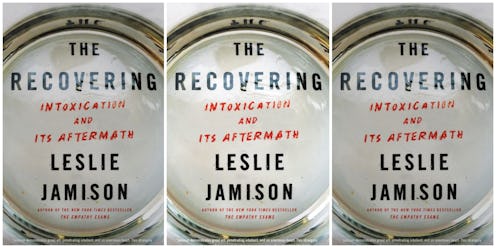Books
'The Recovering' Contains One Quote About Love That I Can't Stop Thinking About

An addiction memoir is probably not the first — nor the best — place to look for wisdom on love, but one thing I have learned in my years of reading is that sometimes the precise words you need to commit to your heart will be found in the least likely of places. For me, that unlikely place was Leslie Jamison's new memoir, The Recovering. To quote a line from the book: "When you're hungry for wisdom, it's everywhere."
Before I begin, let me make one thing clear: The Recovering is about addiction and recovery, and alcoholism is not a metaphor for love or anything else — though of course people who don't have personal experience with alcoholism will still see some of their own life experiences mirrored in this book. As it so happens, Jamison is one of the most insightful, introspective, and compassionate authors I have ever encountered, and all of those qualities make her writing about love as sage, biting, and incisive as her writing on addiction.
Clocking in at over 500-pages, The Recovering is an expansive account of one woman's struggle with addiction, as well as an intellectually rigorous and heavily researched cultural and social history of alcoholism. Jamison interweaves her own experiences with the stories of the creators who preceded her — Billie Holiday, Denis Johnson, Raymond Carver, Jean Rhys, Amy Winehouse, and others who built careers making art about and amid their addictions — and the stories of the people she's met in recovery and elsewhere who shared their experiences with addiction with her. While Jamison presents her story as one unique experience, and a privileged one at that — "My skin is the right color to permit my intoxication," she writes— she provides all the necessary information to make it clear that addiction is a story of a community, one that can never be told in full through one person.
The memoir is peppered with stories from all those years she spent drinking that both have nothing and everything to do with alcoholism, specifically the romantic relationships that were built upon the shaky foundation of her drinking. "Falling in love," she writes. "was the only sensation that had ever truly rivaled drinking — for buzz and transportation, sheer immersive force..."
The Recovering: Intoxication and its Aftermath by Leslie Jamison, $19.49, Amazon
Jamison grapples particularly with her own perceived lack of exceptionalism and her own belief that she does not deserve or will not receive love unless she is somehow different from everyone else. She writes that she suspects that love comes "as a reward for saying the right things."
But when Jamison first enters Alcoholics Anonymous, this worldview is challenged. "The insistence on simplicity was part of AA's larger insistence that we were all the same, which was basically a way of saying f*ck you to my entire value system," she writes. "My whole life I'd been taught that something was good because it was original — that singularity was the driving engine of value. Make it new, the modernists had said."
This mentality — that simplicity is bad; that uniqueness is good — colored her perceptions of love, too. "I'd always understood love in terms of singularity as well, an assumption I'd held so close it had become nearly transparent: I'm loved because I'm not quite like anyone else. Whenever someone talked about the unconditional love in the rooms of recovery, I always wanted to shout: You can't love me! You don't know me!"
The quote that follows is one that has stuck with me since I first read the book. She writes:
"Actually, when it came to love I had somewhat contradictory desires. I wanted to be loved unconditionally; simply because I was but I also wanted to be loved for my qualities: because I was x, because I was y. I wanted to be loved because I deserved it. Except I was scared to be loved like this, because what if I stopped deserving it? Unconditional love was insulting, but conditional love was terrifying. This was something Dave and I had talked about — being loved for qualities or without conditions. He taught me the notion of love bestowed stam, as they said in Hebrew, for no earthly reason: because because."
I sent this passage to a friend recently. "This hit me on a spiritual level," she told me, a simple comment that somehow perfectly summarized how I felt while reading this memoir. Though I have experience with loved ones who are addicts, I am not an alcoholic, and can say only that this memoir gave me a clearer understanding of what it means to navigate the world as one. But I have struggled with my own ideas about deserving love, not being special enough for love, or loving for no logical reason at all.
I took away many things from my reading of this memoir, and this quote — now imprinted upon my heart — is just one of many of them. I cannot recommend that you read Jamison's memoir solely for her philosophies on love, but I can recommend that you open this book with the expectation that you may walk away with more than just a better understanding of addiction. To me, The Recovering proved the secret superpower of memoir as a genre: that someone's darkest secrets and most shameful, hidden thoughts and insecurities can be exactly the thing that someone else needs to read.